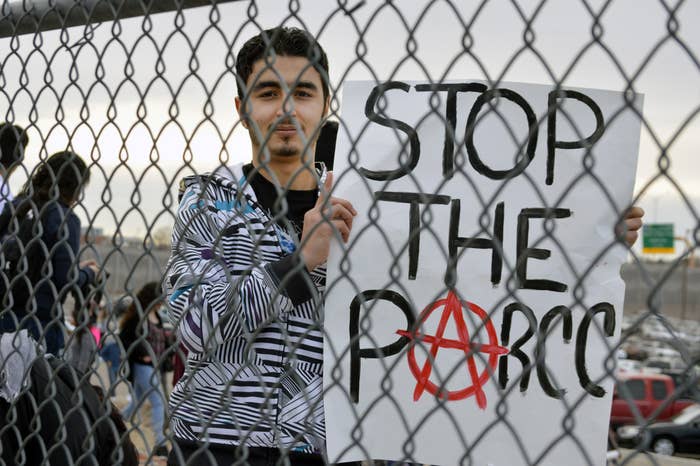
Pearson, the world's largest education company, has made hundred of millions of dollars off of the Common Core. It has won lucrative contracts to design and administer Common Core tests all over the country, and its name is stamped on Common Core-aligned textbooks and homework assignments taken home by millions of American students.
But Pearson's close alignment with the Common Core — its name has essentially become synonymous with tests linked to the standards — has also become a growing liability for the company and its public image. Sixty percent of Americans say they oppose the Common Core, and so do many pundits on both the right and the left.
They have played a major role in dragging seemingly minor scandals involving Pearson — which would have once been the territory of a few niche bloggers — into the national spotlight.
In a bid to diversify its business, which was once heavily reliant on a now-declining print textbook industry, the London-based Pearson has worked to expand its footprint in American standardized testing. After entering the market in 2000, just before the rollout of the test-heavy No Child Left Behind Act, Pearson now has a market share of 39% in the testing industry — dwarfing its competitors, none of which control more than 15%. Testing contracts bring in more than $250 million a year for Pearson, according to a Brookings Institute analysis.
That testing business connects Pearson to the furor over Common Core standards, which have become one of the most controversial topics in American education. Pearson won the Common Core's most lucrative contract, a testing contract by the Partnership for Assessment of Readiness for College and Careers, or PARCC, which could be worth more than $100 million in this year alone.
Opposition to the Common Core, now more than a year old, has hardly faded from the news: In his speech announcing his presidential campaign yesterday, Ted Cruz called to "repeal" Common Core, putting the standards alongside the Affordable Care Act as examples of government overreach. "Instead of a federal government that seeks to dictate school curriculum through Common Core, imagine repealing every word of Common Core," he said. "Imagine embracing school choice as the civil rights issue of the next generation."
When the comedian Louis CK delivered a Twitter rant against the Common Core, he blamed "pearson or whoever the hell" for writing confusing test questions that made his daughters cry — what he called a "dark time" in American education.
Last week, anti-Common Core sentiment stoked the flames of Pearson's biggest controversy yet. An education blogger, Bob Braun, broke the news that Pearson was monitoring social media use by students taking its tests for leaked test questions — as Braun put it, "spying."
Teachers unions, longtime foes of Pearson's, capitalized on the story, criticizing the company in the name of student privacy and starting a petition demanding it end its practices. But the story brought out the ire of the right-wing media, too, largely because it was instantly linked to Common Core — and right-wing fears about government overreach.
The conservative website Breitbart published several articles on what it called "the Common Core's Pearson spying on kids." On Twitter, an anti-Pearson hashtag promoted by teachers union president Randi Weingarten, #PearsonIsWatching, began appearing next to #StopCommonCore. Politico called Pearson and the company it had hired to monitor students' accounts "The Common Core's Cyber Spies."
@JerzyLuv2A I made Savannah lock down her social media accts👉 http://t.co/YdurlP0DW8 #StopCommonCore #BigBrother #pearsoniswatching 😡
Why are kids being monitored at school and at home? #StopCommonCore #pearsoniswatching
By the end of the week, major media outlets across the country had written up the furor over the "Common Core test company," as the Cleveland Plain Dealer called Pearson. Pearson and the states that the company contracted with were left scrambling to change the policies, with states announcing they would handle social media monitoring themselves rather than handing over the task to Pearson.
In reality, however, the details of the story were far from controversial. Pearson said the social media monitoring was mandated by its testing contracts in order to make sure no questions were leaked, was confined only to public posts, and, according to the company, involved no "snooping" other than looking at hashtags and basic information students put in their profiles. It had been standard practice for years; Politico reported that all but one other major testing company performed the same type of monitoring, as do hundreds of school districts across the country.
Last year, another Common Core-linked story painted Pearson in a negative light: Teachers began complaining of a Pearson-imposed "gag order" that prevented them from publicly discussing the new Common Core tests they had just given to their students. A New York Times op-ed skewered Pearson for the practice, and the Washington Post wrote about a campaign by the American Federation of Teachers demanding that Pearson end the practice.
Pearson said it had no control over the order, which was a policy imposed by New York state.
It remains to be seen whether Pearson's entanglement with the Common Core might cost the company more than its public image. Texas, a staunchly anti-Common Core state, opted not to automatically renew its massive $500 million testing contract with Pearson, a huge revenue source for the company. Texas opened the contract up to other bidders; the results are expected to be announced this spring.
The decision to change social media monitoring policies for the PARCC exams was made by the states, not by Pearson. A previous version of this article said it was Pearson's decision to change the policy.
